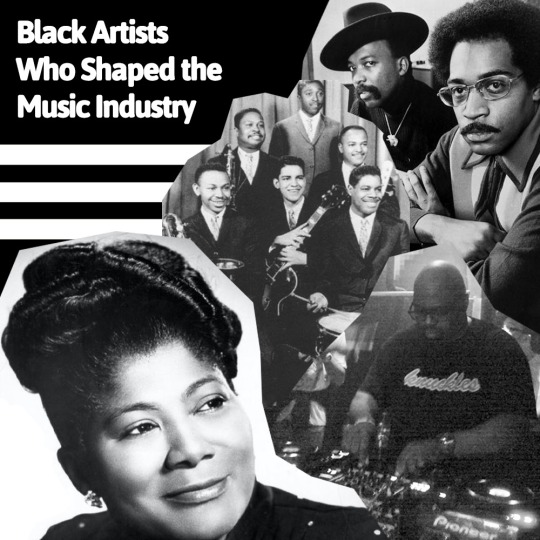How Mahalia Jackson Blessed the Masses

A painting is a collaboration of three things: the canvas, the creators, and the acrylics. If the music industry is a painting, then Black musicians are all three. Black musicianship has played a role in every facet of American music. The focus here is not on the Black musicians we all know and love but rather on the stories that too often remain untold.
In honor of Black History Month, we will take you back through the decades, highlighting four music pioneers: Mahalia Jackson, The Funk Brothers, Gamble and Huff, and Frankie Knuckles. From Gladys Bentley and Deford Bailey to Marian Anderson and Jackie Wilson (the original Elvis, who bridged R&B and soul), there are so many incredible yet overlooked narratives that not only crafted unprecedented genres but also created the foundation for most of the music we listen to today.
In the 1930s and '40s Sister Rosetta Tharpe caught the world's attention as one of the first gospel recording stars and the first to draw in R&B audiences. But she did even more than introduce gospel to the mainstream. Using an electric, slightly distorted guitar sound to accompany herself, Tharpe pioneered the early sounds of rock'n'roll. Often called the Godmother of Rock and Roll, Tharpe was simultaneously paving the way for Mahalia Jackson, the Queen of Gospel.
Mahalia Jackson carried on Tharpe's torch, igniting the role of gospel in the mainstream, lending her voice to both mass audiences and to the civil rights movement. Harry Belafonte described Mahalia Jackson as “the single most powerful black woman in the United States."
Inspired by blues artists like Bessie Smith, Jackson combined the note-bending soul of blues with the belting courage of gospel. As she explains it, "With the blues, when you finish, you still have the blues… I sing God’s music because it makes me feel free. It gives me hope."
She carried with her the spirit of the black church, using her entire body to transcend her performance, clapping her hands, stomping her feet and touching people's hearts. Smith and Jackson paved the way for artists like Elvis Presley and Jerry Lee Lewis who also recorded and performed gospel albums. The popularization of gospel was not only adapted by other artists, but also helped shape the sound of coming decades, starting with soul and Motown.
Born in 1911, in the Carrollton neighborhood of New Orleans, Jackson lived in a three bedroom home with 13 family members. At the age of four or five, her mother passed and her aunt raised her and her siblings. By that age, however, Jackson had already begun singing at Mount Moriah Baptist Church, her childhood place of worship.
In 1931, Jackson moved to Chicago where she was invited to join the Greater Salem Baptist Church Choir and toured around the region's churches with Johnson Gospel Singers. Six years later, she became the first gospel singer signed to Decca and traveled to perform with her infectious stage presence. Fast forward almost ten years, Jackson recorded "Move On Up a Little Higher" which, in 1948, became the best selling gospel record of all time.
The turn of the decade marked the turn of Jackson's career, as she became the first gospel singer to perform at Carnegie Hall. In 1952, her recording of "I Can Put My Trust in Jesus" won a prize from the French Academy, prompting a European tour. Jackson's success became so massive that in 1954 she started hosting her own weekly radio series on CBS, which was the first gospel-focused national program. The show featured both black musicians and a white quartet, prompting a blend of gospel with the "doo-wop" style of the times.
While this grew her white audience, some gospel purists were upset with the crossover (Tharpe experienced similar criticism). That same year, Jackson signed to Columbia and released an album fittingly titled, "The World's Greatest Gospel Singer." She also broke into the Top 40 list with "Rusty Old Halo."
At the National Baptist Convention in 1956, Mahalia Jackson met Dr. Martin Luther King Jr. who asked her to sing at a rally to raise money for the ongoing bus boycott in Montgomery. Soon enough, Jackson began appearing regularly to sing, usually before Dr. King's speeches. As Jesse Jackson explains, she never denied Dr. King and even traveled with him through the segregated south. Jackson also sang at John F. Kennedy's inaugural ball, at the March on Washington, and at Dr. King's funeral.
Further expanding her legacy, Jackson won the first ever Grammy for the Gospel Music and Other Religious Recording category, an award whose creation she inspired and won three years in a row from.
Jackson passed away in 1972, but many greats like Sammy Davis Jr and Ella Fitzgerald attended her funeral to pay their respects and celebrate her legacy. Aretha Franklin closed the funeral with "Precious Lord, Take My Hand." There was also a service held in New Orleans where both the mayor and Louisiana governor accompanied over 20 limos as they drove past her childhood place of worship, where her recordings were blasted through the speakers, audible even from her burial site at Providence Memorial Park.
Later, that year, Jackson won the Grammy Lifetime Achievement Award. She has since been inducted into multiple halls of fame, including the Grammy, Rock and Roll, Gospel Music, and of course, Louisiana Music Hall of Fame, where there is a performing arts theatre reopened in her name.


![Mandolin Captures a Palpable Warmth in ‘same feeling, different font’ [Q&A]](https://s3-us-west-2.amazonaws.com/onestowatch-v2/mandolin-album-interview-1770163743.jpeg)
